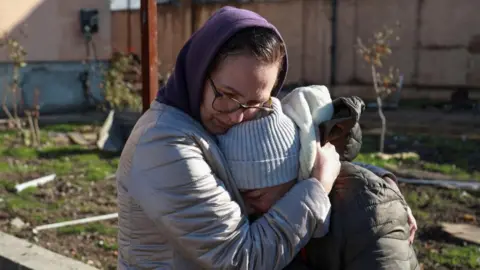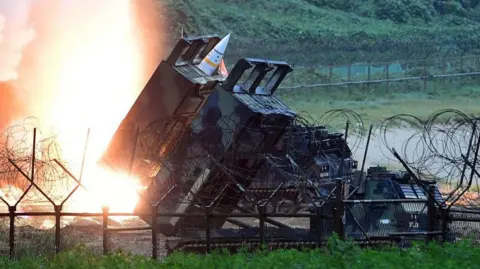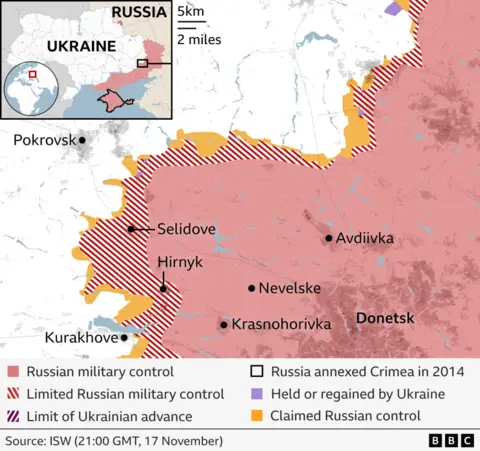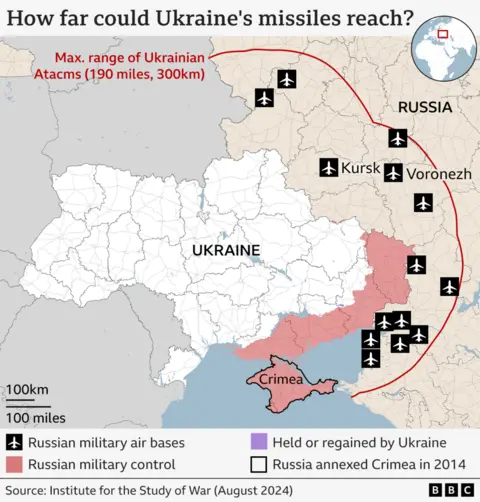Russia and US battle for advantage in Ukraine war ahead of Trump’s return
 Getty Images
Getty ImagesIn a matter of days US President Joe Biden’s administration and Russia have made separate – but significant – moves aimed at influencing the outcome of the war in Ukraine, two months ahead of Donald Trump’s return to the White House.
There is a sense of Moscow maximising its gains and of Biden abandoning long-held red lines before Trump seeks to deliver on his claim to end the war in 24 hours.
Ukraine has already acted on Biden’s decision to let Kyiv fire first long-range ATACMS missiles deep into Russian territory. As Kyiv struggles to hold on to its territory in the east, Biden has promised to send anti-personnel landmines, too.
What prompted Biden’s change of heart appears to have been the arrival of thousands of North Koreans deployed to the front line, which the US sees as a “massive escalation”.
But Russia’s President Vladimir Putin has ratcheted up the tension still further by loosening the conditions of use for Russia’s nuclear weapons. That “effectively eliminates” defeat on the battlefield, claims Moscow.
One Russia commentator suggested Putin might view the current situation as an “in-between” moment that gives him the sense he has the upper hand in Ukraine.
 South Korean Defense Ministry via Getty Images
South Korean Defense Ministry via Getty ImagesAt the start of this week, Russia launched its biggest aerial attack on Ukraine for almost three months. Amid fears of a renewed strike on Wednesday, several Western embassies closed their doors.
“It’s all connected,” says Mykhaylo Samus, head of the New Geopolitics Research Network in Ukraine. He argues Russia has been stockpiling hundreds of Iskander and Kinzhal missiles for weeks to enable it to carry out strikes and thus send a psychological message ahead of the transfer of power in Washington DC.
Ukraine’s capital, Kyiv, may have spared on Wednesday, but the message got through.
“Everything is about preparing for a strong position for talks with Trump, to understand Russia is not going to make compromise and everything depends on [Ukraine’s President Volodymyr] Zelensky.”
“There’s clearly an effort ahead of Trump to maximise their standings,” agrees Jade McGlynn, from the war studies department at King’s College London. She is highly sceptical that a deal with Vladimir Putin is possible – and that ultimately his aim is to subjugate Russia’s southern neighbour.
Ukraine marked 1,000 days since Russia’s full-scale invasion on Tuesday with Russian forces waging relentless attacks in a bid to seize key hubs in the east of Ukraine.
The mood in Moscow appears to be that it is only a matter of time before Ukraine is in its hands, says Tatiana Stanovaya of the Carnegie Russia Eurasia Center.
From January, however, Putin will have to consider other factors, she says: “He will have to deal with the fact that Trump now is responsible for the situation. If Putin escalates, it can worsen the chances for a deal. He will have to be more flexible, more open to different options.”

Biden’s decision to allow Kyiv to begin firing ATACMS into Russian territory was clearly directed at helping Kyiv, but it was felt by the Trump entourage, too.
Although Trump has so far said nothing, his pick for National Security Adviser, Mike Waltz, spoke of “another step up the escalation ladder and nobody knows where this is going”.
He did not go as far as some on the Trump team. Donald Trump Jr complained Biden was trying to “get World War Three” going before his father could even return to the White House.
“There’s one president at a time,” said State Department spokesman Matthew Miller “When the next president takes office, he can make his own decisions.”
Some Republicans have backed Biden’s move, although Sen Lindsay Graham said he should have done it “to help Ukraine and he’s playing politics with it”.

Russia’s reaction may or may not be an empty threat.
Under its revised nuclear doctrine, Moscow will now be able to use nuclear weapons against non-nuclear countries that are backed by nuclear powers, and if it comes under “massive” air attack, too.
Alexander Ermakov from the Russian International Affairs Council says the change is not so much as an operational manual for using nuclear weapons, but “primarily it serves as a declaration to potential adversaries, outlining the scenarios in which such measures could be considered”.
Another message from Putin to the West, then.
Tatiana Stanovaya believes it is not that he wants to start World War Three, but because “he believes he must scare the Western elites to show they are playing with fire”.
What happens beyond January is anyone’s guess.
Kremlin insiders have already begun briefing about their minimal demands from any Trump initiative to end the war, and Volodymyr Zelensky has begun making his position clear too.
Asked in a US TV interview what would happen to Ukraine if Washington slashed military aid, he was clear: “If they will cut, I think we will lose. Of course, anyway, we will stay and we will fight. We have production, but it’s not enough to prevail.”
Putin insists Ukraine will have to remain neutral for any relations to work, even though it is now part of Ukraine’s constitution to join both Nato and the European Union.
A Reuters news agency report on Wednesday cited Russian officials saying Putin might be open to pulling out from relatively small patches of territory but nothing bigger.
Zelensky on Tuesday presented his 10-point “resilience plan” to parliament, and one defiant message rang out in the Verkhovna Rada more than most.
“Maybe Ukraine will have to outlive someone in Moscow in order to achieve all its goals… to restore the full integrity of Ukraine.”
One day Russia would be without Putin, in other words, but Ukraine would be going nowhere.
For Ukrainians that wait could take years, says Mykhaylo Samus, but they would never consent to abandoning Crimea or any other territory under Russian occupation.
The most Zelensky might be prepared to sign would be a ceasefire without commitments, he believes. Anything else would lead to internal conflict as many would view it as a betrayal.
Ahead of any talks Mykola Bielieskov of the National Institute for Strategic Studies in Kyiv believes the key is to prevent any major Russian breakthrough in the east.
“For us it’s just necessary to localise [Russian] advances… using Atacms, anti-personnel landmines or whatever. Because if the Russians are successful they would try to dictate terms.”
Speaking to the BBC from Kharkiv, Jade McGlynn said few Ukrainians believed Trump would be able to engineer any kind of lasting peace deal.
Any kind of settlement that left Ukraine in a much worse position would lead to political chaos, she said.
“Europe needs to step up,” she said, “and ultimately we know that the Scandinavians, Baltic states and Poland are not enough.”
